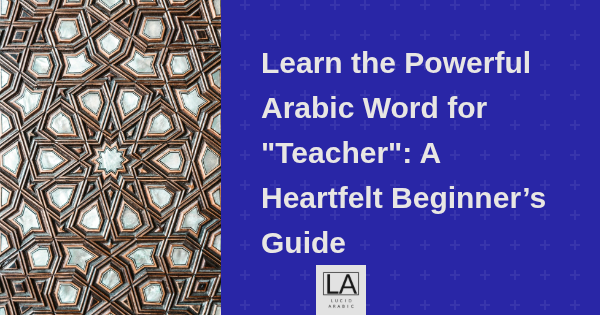Learn the Powerful Arabic Word for “Teacher”: A Heartfelt Beginner’s Guide
Are you beginning your Arabic language journey? One of the most meaningful words you’ll come across is “teacher.” Learning how to say “teacher” in Arabic is more than just expanding your vocabulary — it’s about honoring a role deeply respected in Arabic-speaking cultures. In this post, you’ll discover how to say and pronounce this important word, understand when and how to use it, learn a cultural fun fact, and get helpful tips for practice.
1. The Phrase: “Teacher” in Arabic
The Arabic word for “teacher” is:
مُعَلِّمٌ (Muʿallim) – masculine
مُعَلِّمَةٌ (Muʿallimah) – feminine
Pronunciation Guide:
- Mu – like “moo” in “moon”
- ʿal – the “ʿ” is the Arabic letter ع (‘Ayn), a throaty sound that’s unique but becomes easier with practice
- lim – like “lim” in “limit”
- Muʿallim – moo-ʿAHL-lim
- Muʿallimah – moo-ʿAHL-li-mah
If the ‘Ayn (ع) feels difficult, don’t worry! It may take time, but it’s okay to begin softly until it feels more natural.
2. Usage Context: When and How to Use It
The word “مُعَلِّمٌ” is commonly used in schools, universities, and even casual settings when talking about someone who teaches or shares knowledge. It’s also used as a respectful title when addressing or speaking about teachers.
Common Scenarios:
- In school: “This is my teacher.”
- At language class: “I love my Arabic teacher.”
- In daily conversation: “My father is a teacher.”
Arabic, being gender-specific, distinguishes between male and female teachers, so be mindful:
- Say مُعَلِّمٌ (Muʿallimun) for a man.
- Say مُعَلِّمَةٌ (Muʿallimah) for a woman.
Example Sentences:
- أُسْتَاذِي مُعَلِّمٌ مُمتَازٌ.
Ustādhī muʿallimun mumtāzun.
(My teacher is excellent.) - ٱلْمُعَلِّمَةُ شَرَحَتِ ٱلدَّرْسَ جَيِّدًا.
Al-muʿallimatu sharahat ad-darsa jayyidan.
(The teacher explained the lesson well.)
You can also use أُسْتَاذٌ (Ustādhun) as another respectful term for male teachers and أُسْتَاذَةٌ (Ustādhah) for female teachers — especially in formal settings or universities.
3. Fun Fact: The Teacher’s Role in Arabic Culture
In many Arabic-speaking countries, teachers are viewed with deep respect and often seen as moral guides as well as educators. The Arabic proverb:
مَنْ عَلَّمَنِي حَرْفًا، صِرْتُ لَهُ عَبْدًا.
Man ʿallamanī ḥarfan, ṣirtu lahu ʿabdan.
translates to:
“Whoever teaches me a letter, I become his servant.”
This beautiful expression highlights the honor and gratitude shown toward teachers. In traditional communities, people often continue to refer to their former teachers as أُسْتَاذٌ or مُعَلِّمٌ even years after finishing school.
So, when you use this word, you’re engaging with a deep cultural value that appreciates learning and guidance.
4. Practice Tip: Speak With Respect and Confidence
To master saying “teacher” in Arabic, practice it daily in both speech and writing. Use it in different contexts to build fluency and feel natural when speaking.
Tip 1: Practice Gender Variations
Try switching between مُعَلِّمٌ and مُعَلِّمَةٌ when practicing with different names.
Examples:
- مُعَلِّمِي ٱسْمُهُ سَامِي.
Muʿallimī ismuhu Sāmī.
(My male teacher’s name is Sami.) - مُعَلِّمَتِي ٱسْمُهَا لَيْلَى.
Muʿallimatī ismuha Laylā.
(My female teacher’s name is Layla.)
Tip 2: Roleplay Introductions
Pretend you are introducing your teacher to someone. For instance:
- هَذَا مُعَلِّمِي. هُوَ رَائِعٌ.
Hādhā muʿallimī. Huwa rāʾiʿun.
(This is my teacher. He is wonderful.) - هَذِهِ مُعَلِّمَتِي. أُحِبُّ دُرُوسَهَا.
Hādhihi muʿallimatī. Uḥibbu durūsahā.
(This is my teacher. I love her lessons.)
Tip 3: Pair with Action Words
Use verbs like:
- يَشْرَحُ (yashraḥu) – explains
- يُدَرِّسُ (yudarrisu) – teaches
- يُحِبُّ (yuḥibbu) – loves
Create sentences like:
- ٱلْمُعَلِّمُ يَشْرَحُ ٱلْقَوَاعِدَ جَيِّدًا.
Al-muʿallimu yashraḥu al-qawāʿida jayyidan.
(The teacher explains the grammar well.)
5. Why “Teacher” Is a Must-Know Word in Arabic
Learning how to say “teacher” in Arabic helps you express gratitude, show respect, and speak in meaningful conversations. Whether you’re learning Arabic as a student, traveler, or enthusiast, using مُعَلِّمٌ properly will help you connect with others in a deeper way.
Also, if you’re ever in an Arabic class, this word will be one of the first you hear every day. So why not master it early and use it with confidence?
Conclusion: Appreciate and Use “Muʿallim” with Confidence
The word “teacher” in Arabic — مُعَلِّمٌ or مُعَلِّمَةٌ — is powerful, emotional, and culturally rich. Learning it opens the door to more respectful and thoughtful conversations. It’s a word that brings people together, honors learning, and builds trust.
So go ahead — practice it aloud, use it in your sentences, and try greeting your own Arabic teacher with it!
هَلْ كَانَ لَكَ مُعَلِّمٌ مُلْهِمٌ؟ جَرِّبْ أَنْ تَكْتُبَ عَنْهُ بِٱلْعَرَبِيَّةِ!
Hal kāna laka muʿallimun mulhimun? Jarrib an taktuba ʿanhu bil-ʿArabiyyah!
(Have you had an inspiring teacher? Try writing about them in Arabic!)

